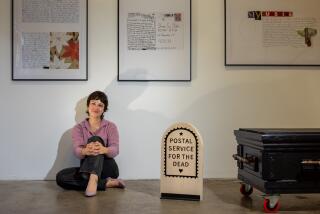Some Musty Messages Home : Serviceman Wrote Sooner but Delivery Was a Lot Later
- Share via
Sam Jones, a young serviceman from Ramona on board ship in the Mediterranean, wrote a letter back home to his brother and sister-in-law, lamenting the loneliness of Army life and the fact that he had just had to spend his 20th birthday at sea.
“Dear Jack and Helen,” the letter began, “Sorry I didn’t write sooner.”
Jack received the letter Monday--more than 42 years after it was written.
That correspondence was among 235 letters written in May, 1944, by servicemen aboard the troop ship Caleb Strong that were never delivered, said officials with the U.S. Postal Service. A soldier assigned to mail the letters upon his return to the United States apparently forgot to do so, and the letters spent the next 42 years in the attic of the soldier’s aunt in Raleigh, N.C.
But last spring, an exterminator working in the attic discovered an old duffel bag. Inside he found the missing letters among some old socks and other wartime mementos. Since then, postal officials have been trying to return the letters to their senders. A few weeks ago, they finally tracked down Jones, now an El Cajon resident, and George Ley of Oceanside, who had also written a letter that was found in the attic.
In ceremonies Monday at the San Diego Main Post Office, Postmaster Margaret Sellers presented the letters to the two men. The intended recipients, Jack Jones and Ley’s wife, Joan, then opened the letters.
“It was kind of a strange feeling, seeing all those things you’ve done in the past,” Sam Jones said after reading the letter, which was dated May, 14, 1944. “Mostly I had told them that I’d just spent my birthday in a hell of a place, on board ship in the middle of the ocean.”
At the time he wrote the letter, Jones was on his way to Oran, Algeria, from Newport News, Va., where he had been stationed after enlisting in the Army Air Force. Asked if the letter had given him any insights into the type of person he was at age 20, Jones replied: “I could see that I didn’t know much about letter writing.”
Ley was a 24-year-old Air Force technical sergeant on his way to the Orient when he wrote the letter to Joan, his wife of a year. He described the contents of the letter as “patriotic.”
“I mention in there that I hated being gone, but that everybody had to do their part,” he said.
To locate the letter writers, the Postal Service first tried sending notices to the last known addresses of the ex-soldiers and notifying the postmasters in those areas, said Postal Service spokesman Mike Cannone. Finally, the office had lists of the servicemen published in newspapers around the country, he said.
The delivery of the letter written by Ley and six letters penned by Jones brought the number of returned letters to 178, Cannone said proudly.
“I’d say we’ve done exceptionally well considering that 42 years have passed,” he said.
The Postal Service had little trouble locating Jones, since his brother still lived in Ramona. However, Ley was found through sheer happenstance when an employee in the personnel department at the Oceanside electronics firm where he works recognized his name from a list published in a newspaper.
In addition to the letter to his brother, Jones on Monday also received letters he had written to his mother and another sister-in-law, both of whom have since died, and three Army friends with whom he has since lost contact. Jones said he won’t open those letters, preferring to preserve them as “keepsakes.”
The lost letters were supposed to be sent free of charge as “Victory Mail,” a system under which soldiers’ mail was transferred to microfilm to reduce the bulk of the G.I.s’ correspondence. Ley’s letter to his wife was one of the few exceptions; it had been affixed with a 6-cent air mail stamp.
“I had written two letters to her--one through V-Mail and one with the air mail stamp--to see which one would get there first,” he said.
More to Read
Sign up for Essential California
The most important California stories and recommendations in your inbox every morning.
You may occasionally receive promotional content from the Los Angeles Times.










